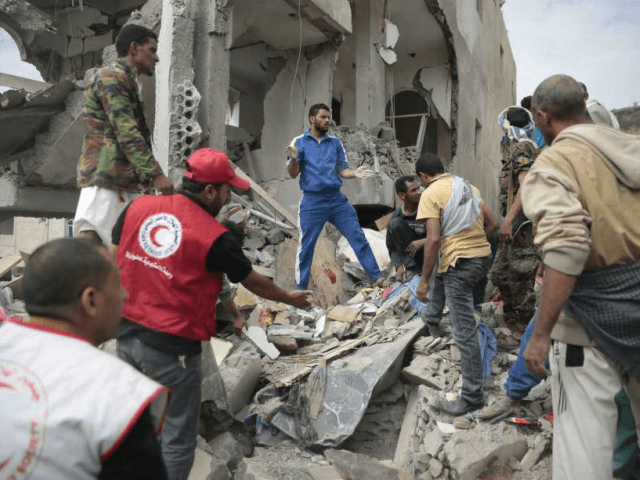The Saudi-led coalition in Yemen announced a new round of strikes in Yemen on Wednesday, as Saudi Arabia invoked its right of self-defense against a weekend missile attack it blamed on Iran acting through proxy forces.
Voice of America reports a military commander loyal to the deposed president of Yemen, Abdrabbu Mansour Hadi, expressed support for the Saudi’s right to respond to the missile intercepted near Riyadh, citing the relevant article of the United Nations charter on each nation’s “inherent right” of self-defense.
Hadi was removed from power in early 2015 by Houthi insurgents allied with Iran. His personal opinion of Saudi Arabia may be somewhat different from that of his military commander, as he is presently under “a form of house arrest” in Riyadh along with his sons and some of his top officials, reportedly due to tensions with Saudi Arabia’s allies in the United Arab Emirates. Hadi was reportedly angered by reports that the UAE is running secret prisons with torture facilities in Yemen, while the Emiratis see Hadi as corrupt and too close to the Muslim Brotherhood.
Until recently, Hadi’s detention consisted of him writing to Saudi King Salman bin Abdulaziz and asking if he could return home to Yemen, and the king refusing to answer his letters. After Hadi made moves to squeeze out members of his cabinet who were backed by the UAE, relations with his Saudi hosts became a bit more strained.
It might make Hadi feel better to know that his predecessor and rival Ali Abdullah Saleh, who threw in with the Houthis to help knock Hadi out of power, is more or less under arrest by his allies too. Oddly enough, when Saleh became grievously ill in October, the Saudis flew in a crack medical team to save his life. This was seen as an effort by the Saudis to keep Saleh alive so he could help “find a way out of the Yemeni quagmire,” as Al-Monitor put it.
The Houthis have largely co-opted forces loyal to Saleh, and have begun thinking about seizing his assets now that they no longer need him. The attack on Riyadh seems to be pulling the Saudis deeper into the war instead of looking for an exit strategy.
Humanitarian activists argue that the total blockade Saudi Arabia imposed on Yemen after the Riyadh missile attack will precipitate a humanitarian catastrophe, and accuse the U.S. and Europe of muting their criticism of the war in Yemen because the Saudis spend so much money buying arms from them. The United Nations has warned war-ravaged Yemen may now experience a famine that could kill millions of people.
VOA quotes political science teacher Khattar Abou Diab of the University of Paris making the ominous prediction that ballistic missile proliferation has increased the dangers of Iran-Saudi Arabia proxy wars blooming into large-scale conflict, citing Houthi threats to begin attacking targets in the United Arab Emirates.
The Atlantic notes that the range of Yemen’s missiles seems to have increased dramatically over the past two years, which among other things could jeopardize commercial air travel into the Kingdom’s airports—exactly the opposite of the conditions Crown Prince Mohammed bin Salman wishes to create in a revised Saudi economy less dependent on oil. That looks like a sizable strategic payoff to Iran in return for a very modest investment of weapons and personnel in Yemen.

COMMENTS
Please let us know if you're having issues with commenting.